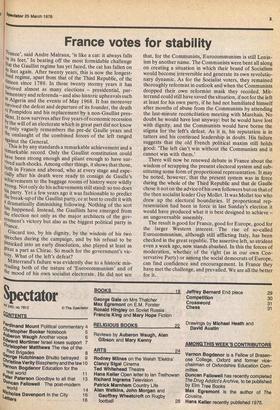France votes for stability
'Prance', said Andre Malraux, 'is like a cat: it always falls its feet.' In beating off the most formidable challenge that the Gaullist regime has yet faced, the cat has fallen on feet again. After twenty years, this is now the longestlived regime, apart from that of the Third Republic, of the siteen since 1789. In those twenty stormy years it has is.urvived almost as many elections — presidential, parliaMentary and referenda — and also historic upheavals such Algeria and the events of May 1968. It has moreover survived the defeat and departure of its founder, the death !it Pompidou and his replacement by a non-Gaullist presLiclent. It now survives after five years of economic recession °Y the will of an electorate which in great part did not know (1r only vaguely remembers the pre-de Gaulle years and the onslaught of the combined forces of the left ranged against the General.
This is by any standards a remarkable achievement and a tielnarkable record. Only the Gaullist constitution could ve been strong enough and pliant enough to have sur!wed such shocks. Among other things, it shows that those, 00th in France and abroad, who at every stage and especially after his death were ready to consign de Gaulle's achievements to the baggage rooms of history were wildly tong. Not only do his achievements still stand: so too does party. Yet a few years ago it was fashionable to predict the break-up of the Gaullist party, or at best to credit it with dramatically diminishing following. Nothing of the sort I"as happened. Instead, the Gaullists have emerged from the election not only as the major architects of the government's victory but also as the biggest political party in France.
Giscard too, by his dignity, by the wisdom of his two sPeeches during the campaign, and by his refusal to be Panicked into an early dissolution, also played at least as great a part as Chirac. So much for the government's victory. What of the left's defeat?
Mitterrand's failure was evidently due to a historic misreading both of the nature of 'Eurocommunism' and of the mood of his own socialist electorate. He did not see that, for the Communists, Eurocommunism is still Leninism by another name. The Communists were bent all along on creating a situation in which their brand of Socialism would become irreversible and generate its own revolutionary dynamic. As for the Socialist voters, they remained thoroughly reformist in outlook and when the Communists dropped their own reformist mask they recoiled. Mitterrand could still have saved the situation, if not for the left at least for his own party, if he had not humiliated himself after months of abuse from the Communists by attending the last-minute reconciliation meeting with Marchais. No doubt he would have lost anyway: but he would have lost with dignity, and the Communists would have borne the stigma for the left's defeat. As it is, his reputation is in tatters and his continued leadership in doubt. His failure suggests that the old French political maxim still holds good: 'The left can't win without the Communists and it cannot win with them.'
There will now be renewed debate in France about the wisdom of scrapping the present electoral system and substituting some form of proportional representation. It may be noted, however, that the present system was in force during the whole of the Third Republic and that de Gaulle chose it not on the advice of his own followers but on that of the then socialist leader Guy Mollet. It was Mollet too who drew up the electoral boundaries. If proportional representation had been in force in last Sunday's election it would have produced what it is best designed to achieve — an ungovernable assembly.
The result is good for France, good for Europe, good for the larger Western interest. The rise of so-called Eurocommunism, although still afflicting Italy, has been checked in the great republic. The assertive left, so strident even a week ago, now stands abashed. In this the forces of moderation, whether of the right (as in our own Conservative Party) or among the social democrats of Europe, can find confidence and encouragement. In France they have met the challenge, and prevailed. We are all the better for it.


































 Previous page
Previous page